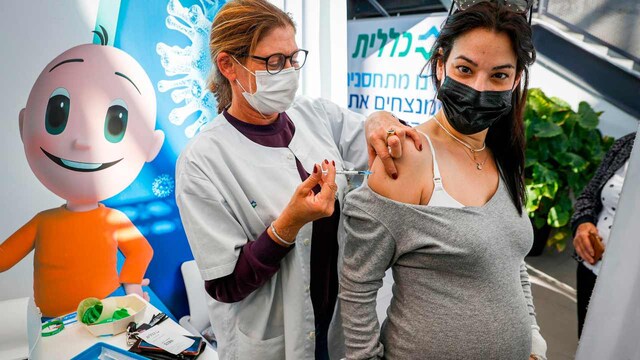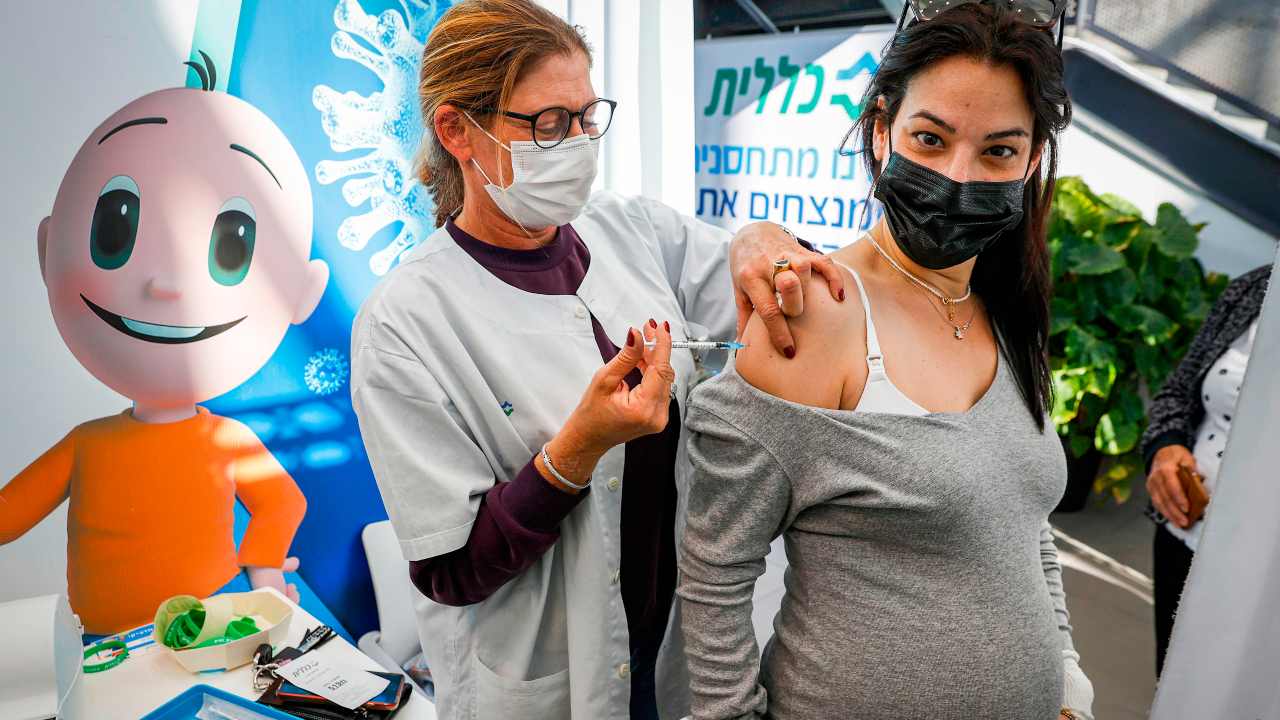AstraZeneca is also monitoring participants in their study who have conceived since their participation in the trial.

A health worker administers a dose of the Pfizer-BioNtech COVID-19 coronavirus vaccine to a pregnant woman at Clalit Health Services, in Israel’s Mediterranean coastal city of Tel Aviv on January 23, 2021. – Israel began administering novel coronavirus vaccines to teenagers as it pushed ahead with its inoculation drive, with a quarter of the population now vaccinated, health officials said. Image: Jack Guez/AFP
Drugmaker Pfizer and its German partner BioNTech are due to start trials for their messenger RNA COVID-19 vaccine in 4,000 women in later stages of pregnancy, as per an online listing in the US clinical trial registry. The mid-stage study of the vaccine, called BNT162b2, will be carried out in 350 volunteers who are vaccinated between their 27th and 34th week of gestation, to ensure the shot is safe to use. Following this, a larger advanced trial with women vaccinated between their 24th and 34th week of pregnancy will also reportedly be held.
vaccine in 4,000 women in later stages of pregnancy, as per an online listing in the US clinical trial registry. The mid-stage study of the vaccine, called BNT162b2, will be carried out in 350 volunteers who are vaccinated between their 27th and 34th week of gestation, to ensure the shot is safe to use. Following this, a larger advanced trial with women vaccinated between their 24th and 34th week of pregnancy will also reportedly be held.
The Pfizer-BioNTech vaccine trials with pregnant women will be carried out in multiple countries, including the US, Europe, South America and Africa, according to a Bloomberg Quint report. The trial’s focus on the third trimester of pregnancy is to minimise risk to unborn children, BioNTech is quoted as saying.
The trial will also look into the vaccine’s safety in babies of vaccinated pregnant women, and whether any protective antibodies may have been transferred to their newborns, Pfizer said in a statement. While the study’s pregnant volunteers will be enrolled and monitored for a period of seven to ten months (depending on whether they received the vaccine or placebo), the infants will be monitored for roughly six months post-partum.
Pfizer and BioNTech also said the vaccine will be tested in the months to come in older children between ages five and eleven, and in children younger than five in late 2021. The ongoing Phase 3 trial already includes children between ages 12 and 15 years. The companies also shared their plan to evaluate the vaccine in immunocompromised population next.
AstraZeneca has also made arrangements to monitor participants in their Phase 3 study who conceived after their participation in the trial. The company, along with its partner Oxford, told a government panel in January that 21 women from their trials became pregnant after vaccination. This is in addition to the 23 women from the Pfizer-BioNTech trials that reported in 2020 they were expecting, the Bloomberg report added.
So far, the Pfizer-BioNTech COVID-19 vaccine is one of three vaccines that have been given Emergency Use Authorization (EUA), for immunization to prevent coronavirus
vaccine is one of three vaccines that have been given Emergency Use Authorization (EUA), for immunization to prevent coronavirus disease 2019 (COVID-19) in people of ages 16 and older. The other two vaccines are the Oxford-AstraZeneca/Serum Institute vaccine, and the Bharat Biotech COVID-19
disease 2019 (COVID-19) in people of ages 16 and older. The other two vaccines are the Oxford-AstraZeneca/Serum Institute vaccine, and the Bharat Biotech COVID-19 vaccine Covaxin.
vaccine Covaxin.










